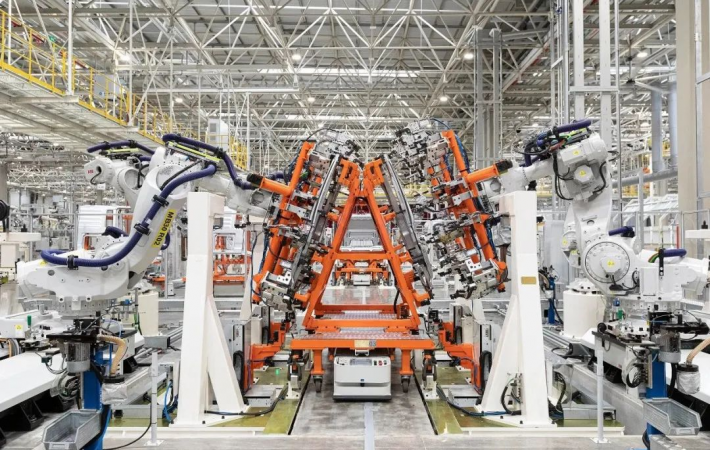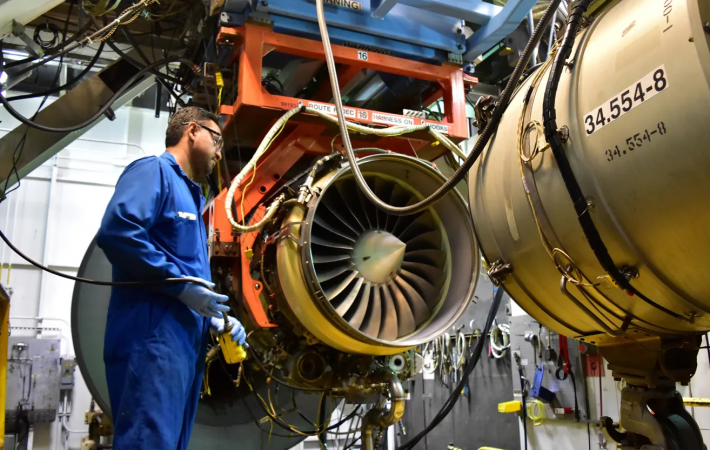As the United States launches another round of tariff wars and disrupts the world trade order, how can we focus our attention inward and firmly do our own thing?
Local governments actively respond to the “tariff war” to help enterprises meet the challenge
In response to the impact of the US tariff increase, companies in Chongqing and Fujian have recently made active adjustments and responded proactively.
In a foreign trade company in Bishan District, Chongqing, workers are stepping up to rush to produce a batch of orders to be sent to Russia.
Luo Yong, head of a Chongqing New Energy Co., Ltd.: Since last year, we have been actively expanding emerging markets such as the EU and Russia to reduce the risk of dependence on a single market. We expect exports to emerging markets to increase by 20% this year, which can offset our losses in the US market.
Suman, a British customer, is about to sign an order worth $5 million.
British businessman Su Man: We are very happy to visit this factory. The product quality is very good. We hope to maintain a long-term cooperative relationship.
It is not just this company. The reporter found that since this year, many foreign trade companies in Chongqing have relied on independent and controllable innovation capabilities to optimize the supply chain, respond to external risks through brand premium, increase profit margins, and fight against tariff barriers. According to Chongqing Customs, in the first quarter of this year, local independent brand products exported 54.2 billion yuan, an increase of 14%, accounting for 56% of the total export value.
Similarly, this foreign trade clothing company in Quanzhou, Fujian, exports more than 90% of its products, of which more than 30% are sold to the United States. Faced with the current tariff situation, the company and its American customers have agreed to split the cost into two and each bear half. The confidence in doing so lies in the confidence in the core competitiveness of their own products.
Zhao Wenhong, deputy general manager of a clothing company in Quanzhou: We have registered our own product patents and formed stickiness with customers. No matter how high the tariffs are, they will still buy our products.
On the one hand, we increase innovation and adjust the market direction, and on the other hand, the government also supports the company.
Zhao Wenhong, deputy general manager of a clothing company in Quanzhou: For example, in terms of financing, loan interest rates, fee reduction and tax reduction, these give our company more support and reduce the pressure on our company. At least in the process of tug-of-war, let our company be more confident and persist longer.
At present, the Fujian Provincial Department of Commerce, Customs, Taxation and other departments are actively improving the reserve policy to help foreign trade companies tide over the difficulties.
How to help the affected foreign trade enterprises tide over the difficulties?
Facing the damage of US tariff bullying to the global trade order, many places have taken action to help foreign trade enterprises cope with market challenges. From the government to the society, how can we help enterprises affected by US tariffs tide over the difficulties?
Wan Zhe, professor and economics expert at Beijing Normal University, analyzed that from the government level, it is mainly based on systematic policy support and strategic guidance. The combination of policies and institutional guarantees will be visible in the future:
In terms of rule game and supply chain reconstruction, my country has already countered the United States, and will also cooperate with other countries and multilateral organizations to weaken the actual impact of US tariffs. In terms of fiscal and taxation policies, it will also directly empower. At the same time, special subsidies will be provided, and some special foreign trade emergency or relief funds will be established. In terms of exchange rate and tariff risk hedging, financial institutions will be encouraged to develop customized products such as tariff insurance to help them lock in costs. In terms of market diversification and domestic demand activation, new market and regional layout will be developed, the integration of domestic and foreign trade will be accelerated, and various channels will be coordinated to open up green channels for foreign trade quality products.
Experts analyzed that for the social level, it is mainly market-oriented coordination and ecological empowerment. Industry associations and industrial chains should cooperate better, including information sharing and collective bargaining.
For enterprises, in the future, they should continue to strengthen their own capacity building and strengthen transformation and upgrading. Including product differentiation, shifting from OEM to independent brands, continuous brand upgrading, developing tariff-friendly products, lightweight design, modular assembly, and reducing the tax rate corresponding to product classification tax numbers. At the same time, regionalization and flexible production of the supply chain are also carried out, and the form of small orders and fast response is promoted, and digital systems are used to quickly switch orders to reduce inventory backlogs.
In the future, a “policy + market + technology” support system should be built. The government stabilizes the basic market through a combination of policies to reduce costs, expand markets, and strengthen innovation. The reliance on social forces, industry coordination, channel empowerment, and financial innovation will improve the risk resistance of enterprises. Ultimately, a benign interaction of government guidance, market dominance, and enterprise initiative should be formed. The key is to help enterprises shift from passive response to tariffs to active optimization of global layout. Through technological upgrades, brand premiums, and supply chain resilience, external pressure can be transformed into an endogenous driving force for high-quality development.
How should we make efforts to do our own thing?
Previously, the Ministry of Commerce stated that under the current tariff level, the market has no possibility of bearing US products exported to my country. If the US continues to impose tariffs on Chinese products exported to the US, China will ignore it. Since we have adopted an attitude of “ignoring it”, where should we focus our attention first?
Wan Zhe said that the key points we should focus on now are first the development of the domestic market and the stimulation of domestic demand. In the future, the government will also give a series of industrial policies to support the development of related domestic enterprises and improve their global competitiveness. In terms of key technological breakthroughs, a group of excellent enterprises have emerged, such as semiconductors, new energy, and biomedicine. In the future, there will be better development in improving the resilience of the supply chain. Continuously increasing R&D investment and talent training can support the further transformation and upgrading of the industry.
Experts predict that the future global market will be a diversified reconstruction, including the development of new markets, and the deepening of regional and cooperation. What is very important is the normative opening and rule reshaping:
Connect with the world’s high standards, participate in the reform of the OECD global minimum tax rate, and prevent multinational companies from transferring production capacity. Include digital tariff mutual recognition clauses in free trade agreements. Protect multilateralism and work with the EU and BRICS countries to promote the reform of the WTO dispute settlement mechanism. At the same time, provide financing for green infrastructure for developing countries and enhance the voice of world rules.
The essence is to use economic laws as weapons and strategic determination as support to achieve a transformation from passive response to active leadership, seek stability internally, seek change externally, and seek progress in innovation. This self-centered strategic choice not only reflects the determination to be patient, but also provides a de-hegemonic Chinese solution for global trade management.
Related product recommendations:
ABB CI581-CN
ABB DSQC1017 3HAC050354-001/02
ABB DSO14
ABB 35EB91 GJR5142600R0001
ABB 3HNA013820-001
ABB 3HAC020914-001
ABB 3BHE037864R0101 UFC911 B101
ABB DSQC352A
ABB E152A03EIOA – 3AXD50000032633
ABB 3HAC14752-2
ABB PM866K02
ABB 3HAC021679-001
ABB DAI 04
ABB HESG447220R4
ABB 1MRK
ABB BRC-100 P-HC-BRC-10000000
More…





Leave a comment
Your email address will not be published. Required fields are marked *